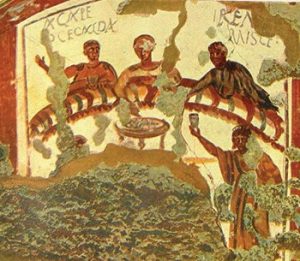
“For just as the body is one and has many members, and all the members of the body, though many, are one body, so it is with Christ. For in the one Spirit we were all baptized into one body—Jews or Greeks, slaves or free—and we were all made to drink of one Spirit” (1 Corinthians 12:12-14).
What is the body of Christ?
Paul’s teaching about the body of Christ would have been quite familiar to the first century believers in Corinth yet; at the same time it sounded strangely odd.
We commonly think that Paul is talking about a mystical union that melds all believers into a “body.” But he probably has something else in mind here. The metaphor of the body appears repeatedly in ancient literature; it pops up where an author wants to speak out against discord in the community, especially political and social discord.

Political discourse and the body
In her book Paul and the Rhetoric of Reconciliation, Margaret Mitchell assembles many examples from ancient literature that use “body” as a metaphor. For example, in Livy we hear Menenius Agrippa speak about the revolt of many members of the body against the belly. “This fable,” Mitchell notes, “is told in a deliberative speech urging the plebs to cease from seditio and work for concordia” (p. 158). The plebs belonged to the lower classes of society; they were told to keep their place, to not cause social unrest, and to seek peace and harmony. In other words, they were to embrace their status in the lowest rungs of society and not protest against their lot or against those of higher social standing.
Ancient authors used the body metaphor to discuss the political organization of society, to stress the interdependence of the various members of the body, and to contend against discord in community. Aelius Aristedes talks about the divided people of Rhodes saying, “Rather you destroy it [your city] by your actions, while you honor it with your speech, and you await the victory of Cleomentes the Laconian, who chopped up his [own] body, beginning with his feet.” He goes on to ask, “And how shall you differ from the women who tore Pentheus apart when you yourselves have torn apart with your own hands the body of the city which you all share?”
Plutarch, as Paul, highlights the necessary roles of the various members of the body: “And yet the illustration of such common use by brothers Nature has placed at no great distance from us; on the contrary, in the body itself she has contrived to make most of the necessary parts double and brothers and twins: hands, feet, ears, nostrils” (compare 1 Corinthians 12:22). But for Plutarch, those who were most necessary were of the upper classes, the elite members of the community. “Body” language was all about social stratification.
Paul on the body
Paul takes a different approach when he talks about the “body of Christ.” Contrary to the common discourse on the body politic that focused on the hierarchies of society and the need to maintain them, Paul changes things up. He turns the “body” on its head!
The apostle stresses mutuality in the body and urges the community to esteem the ones considered to be the lowliest members of the body. All members are necessary and should therefore receive honor:
“The eye cannot say to the hand, ‘I don’t need you!’ And the head cannot say to the feet, ‘I don’t need you!’ On the contrary, those parts of the body that seem to be weaker are indispensable, and the parts that we think are less honorable we treat with special honor. And the parts that are unpresentable are treated with special modesty, while our presentable parts need no special treatment. But God has put the body together, giving greater honor to the parts that lacked it, so that there should be no division in the body, but that its parts should have equal concern for each other” (12:21-25).
Down to the end, Paul stresses the church’s unity in diversity and the importance of every single person in the community. Each one has gifts that are important for the whole body (1 Corinthians 12:7; and 1 Peter 4:10-11).
Social hierarchies and the Church
In the gospel, those whom society deems to be the least important and insignificant are the very ones whom God has chosen and called. As Paul says at the beginning of 1 Corinthians:
“Not many of you were wise by human standards; not many were influential; not many were of noble birth. But God chose the foolish things of the world to shame the wise; God chose the weak things of the world to shame the strong. God chose the lowly things of this world and the despised things — and the things that are not — to nullify the things that are, so that no one may boast before him” (1:26-29).
And every member of the body, regardless of their age or gender, wealth or poverty, social status or ethnicity, nationality or citizenship status, has gifts that are necessary for the well-being of the whole church. Each has a place at the table, and everyone has something of great value to contribute to the whole.
Whose voices do we hear in the church? Who gets to lead? Which members do we call upon to contribute? Whose gifts and calling receive recognition?
“Now to each one the manifestation of the Spirit is given for the common good” (1 Corinthians 12:7).
 Dr. Gene L. Green is the Dean of Trinity International University – Florida. Visit them at tiu.edu/florida
Dr. Gene L. Green is the Dean of Trinity International University – Florida. Visit them at tiu.edu/florida
Read last month’s article by Dr. Gene L. Green at: https://www.goodnewsfl.org/seek-the-welfare-of-the-city/

Comments